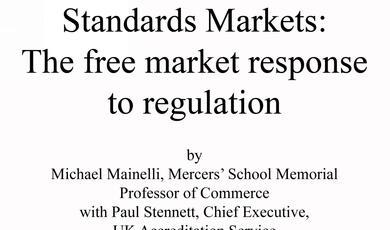The new Capital Accord from Basle
Share
- Details
- Text
- Audio
- Downloads
- Extra Reading
Why it will penalise good banking and the financing of growth for emerging companies and economies. What are the alternatives?
Download Text
The New Capital Accord from Basle
Inaugural lecture of Professor Avinash Persaud
Introduction
Over the course of the last 25 years there has been a slow realisation, that what matters for a successful economy, one that delivers rapidly improving living standards for all, is not the precise levels of interest rates or budget deficits, tax breaks for this or that, it is not the exact calibrations of the instruments of policy; but the institutions of policy.
Three hundred and three years after the Bank of England was founded, we finally hit on the right institutional arrangements for the setting of interest rates. However smart they are - and all Chancellors of the Exchequer consider themselves smart - the temptations of the political cycle have always got the better of them, with interest rates being cut into an election and raised shortly afterwards to repair the damage. The new arrangement, announced by Flash Gordon as he swooped up the steps of the Treasury on his first day at work in 1997, where the Chancellor sets the long-run inflation objective and the Bank has operational independence, is a better institutional framework than before, and the result is more stable and lower interest rates than we might otherwise have had. Prudential Brown may not have killed the economic cycle, but he has probably blunted its political edge.
[These days I have noticed, my brother's - the Consultant Psychiatrist, Dr. Rajendra Persaud - deep commitment to the National Health Service is as much challenged by the institutional organisation of the health service as by its resources.]
One of the most important institutional frameworks for the economy is the regulatory regime for banks. The role of banks was a little neglected a couple years ago, when storming equity markets provided much of the new money flowing to businesses, or at least into the pockets of businessmen. But then as now, most entrepreneurs start up using bank credit card loans; most businesses are too small to raise money on the stock market and depend on bank finance. A well functioning banking system is critical to the vitality of the economy. As Ajit Singh and more recently Amanda Dickens have argued, this is even more the case in countries with underdeveloped financial markets, but it is important in rich countries too, especially now that equity markets are too traumatised to raise cash for companies.
A listing on Germany's small companies market, the Neurmart has become such a liability for companies, given it price performance and its unsavoury reputation for slack corporate governance, that last week they decided to disband the separate listing. The same may be in store for other equity markets designed to bring investors to small businesses like the UK's Techmark. Stock markets are not substitutes for banks; we need them both. Japan has the second largest stock market in the world, but a wrecked banking system has still helped to wreck the economy.
What should be the basis of good and light regulation of banks?
In my view the starting point of good regulation is aligning the points of government intervention with the points of market failure. And those market failures that inflict the greatest social costs should concern us most. To find these points of failure and appropriate intervention we need to remember three things about banking.
The first is that without trying banks pose systemic risks. Banks are more like hedge funds than we care to think. They lend several times their capital, they borrow short-term to lend long-term. And directly or not, their loans are often used as collateral for other loans, so that if a bank pulls its loan early, a whole pack of cards comes tumbling down. The bigger the bank, the bigger the tumble.
In the early 1980s, Citibank, one of the largest US banks became technically insolvent as a result of bad lending in Latin America. It was bailed out by the US Federal Reserve, in the name of saving the US banking system, and the management survived - indeed, prospered. When Barings collapsed in the 1990s, its small size meant the Bank of England had no such qualms. It was allowed to go under and the management were disbarred from the city.
If you are going to fail, better fail big.
In praise of local knowledge
The second thing we need to know about banks is that banking is no more and no less part of the information industry. Which is why one of the most visible consequences of the collapse of information costs has been the disappearance of high street branches. Form-filling in face to face meetings is no longer a cost effective way of gathering information when digital banking means every pound you spend or save is monitored daily. Passing over the subversive thought that George Orwell's Telescreens are today's ATM machines, the key point here is that a good bank is one that knows its customers better than others and so lends to some that others wouldn't touch and draws back from others that the broad markets like.
The Grameen bank in Bangladesh has become a bit of a cult-figure for the big business-is-bad-business brigade but it is an interesting take on credit policy. Grameen lent small amounts of cash to women engaged in cottage industries or small agribusinesses. Previously bankers didn't lend to women, which meant that they didn't have a credit history, nor did they have any collateral, yet Grameen's credit risk management was highly successful, being based on nothing more than the strong social mores of Bangladeshi villagers where women held the purse strings, were too proud to default and were too committed to their extended families to run off. Knowing your customers is key to good banking, how you do so is not.
Herding and pro-cyclicality
The third thing we need to know about banks is that they exhibit herd behaviour. This is not because they are silly, though they may be silly as well. Herding is a rational response to uncertainty. Most market participants I know can be characterised as people who think that somebody out there knows something they don't know, and if you think that, the best policy is to follow them. It is also a rational response to the dangers of being wrong and alone.
Being wrong and in company is not as uncomfortable a place as it might be. You cannot easily be singled out for punishment by the markets or courts and if you and the crowd were spectacularly wrong, you may even get bailed out by the monetary or fiscal authorities.
Herding and uncertainty lead to pro-cyclical banking. Let me explain.
This will be a painful thought for some of you, but imagine that you are a banker, and the economy starts to speed up, asset values rise and risks appear to fall. These developments may be the lagged effects of an interest rate cut and just typical of a cycle that will shortly turn down, or they may be a result of some exciting permanent technological change that everyone is calling the new, new thing. It could be either, your opinion is evenly divided; your risks are not.
If you back the new, new thing, you appear bold and part of the future, if it turns out to be a mistake and you are wrong, you are in good company.
If you back the cycle however, resisting the new trend, you appear hesitant and part of the past, and if you stick to it and it turns out to be a mistake, you are wrong and alone.
These asymmetries mean that in the up cycle you are biased to backing the new, new thing. Your investment and that of others makes the new, new thing look even more like the real thing, convincing more lenders to invest in it. Indeed, the market begins to punish those seen to be slow to catch on to the new, new thing, forcing the more reluctant to invest in it too. Risk is the new virtue and everyone has to wear chinos. When Tony Dye of Philips and Drew sensibly resisted the technology bubble, Phillips & Drew lost money under management and he was forced to resign in 1999, weeks away from the crash. Then the new, new thing, however real, is smothered by too much investment and there is a crash.
In the crash, the previous optimism is seen to be irresponsible - the bezzles associated will all booms - are laid bare and prudence is the new virtue. The market now rewards banks prepared to let opportunities go by if the risks are uncertain. The dark suits return and bankers can't stop saying no. The economy is so starved of finance and investment that once it has bounced off the bottom, an investment boom is triggered.
These booms and crashes are charged with psychology and emotions that infect many aspects of life, work and art. And so it is sometimes hoped that an appeal to sophisticated, quantitative risk management techniques could save us from this rollercoaster. But the irony is that the accoutrements of sophisticated risk management, daily marking-to-market and market-sensitive risk limits only provide a defence if a handful of banks use them. If regulators encourage all banks to use them they will provide no defence and will make the financial system as a whole riskier. The reason being that these models, however sophisticated, are invalidated if there is strategic behaviour, if what you do influences what I do which influences what you do. Strategic behaviour is rife.
For example, banks herded into dot-com stocks in 1998 and 1999, once a few were there the others were compelled to follow for reasons we have discussed earlier. As the market fell and these banks marked-to-market these losses, they breached their risk limits and so were forced to sell some of their dot-com stocks. However, because they were all doing so together, their selling pushed the price of dot com stocks down further, pushing the banks up against their risk limits again and forcing them to sell more stocks. In the December 2nd lecture I will examine this in more detail but for now the lesson is that banks behave strategically, in relation to one another, and in the context of strategic behaviour, any measure of risk based on market prices, however, sophisticated, will be incorrect.
It is why you often see a harried-looking risk manager on the financial pages complaining that this particular disaster was a once in a thousand year event according to his model and you seem to see these once in a thousand year events every few years or so.
And so it goes with booms following crashes as night follows day, the natural rhythm of financial markets. A cycle that is always there, but never fully, precisely, anticipated. If financial markets were any good at stepping out of their own shoes and witnessing their collective behaviour from an independent perspective, these crashes and booms wouldn't happen. Their presence is the market failure.
These three things about banks - the bigger the bank the more the systemic risk, good banking is about using superior information about local risks and bank assessments of risk are inherently pro-cyclical suggests that good banking regulation should:
(1) discourage banks becoming too big to fail,
(2) encourage banks with superior local information, and
(3) use measures of risk that do not chase market prices and market behaviour.
The new regulation of banks coming out of the Basle Committee does the precise opposite.
Regulatory Capture
It is possible, that they are just mistaken. It is possible that they will change the approach after the next consultative process, but it is not probable. It is possible that the regulators have been captured by the large international banks.
I have learned from Jonathan Ward a former regulator that the biggest problem facing regulators is capture. You can see how easily it happens. The bright regulator fairly recently out of college, is called up by the vice chairman of the same bank the regulator would quite like to work for later. The vice chairman explains that are some very complex issues at stake here and that to help clarify them he has asked a Nobel Prize winning economist to write a report explaining why a particular piece of regulation is needlessly hurting banks. The vice chairman adds that if the regulator persists he will have no alternative but to move to the Cayman Islands resulting in a loss of thousands of local jobs.
Capture is so serious that we need proposals to stop it. One popular idea is to impose a period after someone has left a regulator during which she cannot work for a regulated institution. This happens in other fields and is possible. Of course the longer this period, and so the less interesting former regulators would be to banks, the less you will have to pay the regulators and I fear that the pay differential between regulator and regulated will always be a factor in the capture. My preferred proposal, which could be acted upon straight away without any cost is that before a regulator considers any regulation they should ask themselves what would this regulation look like if I were completely captured by the large banks to the detriment of the public good. They should then write this up and distribute it to as many people as possible.
In the case of Basle 2, capture by the large banks would lead to two things.
First the regulation would be very complex. Complexity is the avenue through which the banks capture the regulators. The simpler it is the more you can see what's going on. A five-hundred page rule book, for example, is an intellectual barrier-to-entry to non-bankers. Complexity also makes regulation less easy to enforce.
Secondly, we would expect the regulation to focus on process and less on outcomes, in particular rewarding those banks with sophisticated centralised risk management processes whether they actually work or not. Large international banks are strong on processing data and weak on local knowledge, while smaller banks tend to be weak on processing data and strong on local knowledge. Regulation which provides a subsidy for sophisticated, data hungry, calculations, and allowed the sophisticated banks to use their own risk systems, whether they work or not, would impose higher regulatory costs on the less sophisticated.
This is of course exactly what Basle looks like.
There is complexity where there should be simplicity.
There is a subsidy to sophisticated processes when the focus should be on outcomes.
And this subsidy to sophistication will inadvertently amplify the principal market failure that regulation should be addressing, which is pro-cyclicality.
Let us take an extreme example to prove a point. Take J. P. Morgan Chase, or Citibank or Credit Suisse, banks with very sophisticated approaches to risk management and which, under Basle 2, will have lower capital requirements and perhaps less supervision if the philosophy of the new approach is followed through. Despite their sophistication, perhaps because of their misplaced sophistication, they have been full and present victims of all of the last cycles. They have lost considerable amounts of shareholder's capital on the dot-com bubble, on Enron, on WorldCom on Global Crossing and potentially on their syndication of collaterised debt obligations. Yes they have not failed, perhaps because the market believes they are too big to do so, thereby limiting panic. But the markets are not enamoured with their internal risk systems, their bonds have been downgraded and bondholders have suffered capital losses.
It seems odd to me that our response to this reality, is to reduce regulatory and supervisory hurdles on these systemically important banks.
Now take the Grameen bank. Let us for one fanciful moment imagine Grameen wanted to bring micro-finance to an OECD country like Mexico, Poland or Korea. Under Basle 2 we would say to this banking operation, which was inherently less systemic and intrinsically less part of the herd that it should have a higher capital requirement per loan because it lends to people the credit rating agencies consider high risk and because they do not have the same degree of credit history, factors which were pivotal to the original success of this bank.
Clearly the more data a bank has the better, and there are too many banks operating with insufficient data, but the Grameen bank example emphasises that we should be focused on outcomes not processes which may or may not work.
Focusing on outcomes would allow competition to find the best processes, which is better than having unproven processes imposed by the regulators and it would encourage diversity of approaches, a diversity that would moderate herd behaviour.
Basle 2 will lead to more amplified cycles and more instability. Quite apart from the technical issue of how risk weights are mapped to internal ratings, this cyclicality will impose it's greatest burdens on risky borrowers, small companies and developing countries. The cyclicality of lending will lead to a volatility of returns that would dampen the long-run average flow of capital. In the boom time developing countries will receive more capital than they have capacity for, initially leading to high returns and then leading to bad investment decisions and in the crunch, the flows will stop and defaults will rise as these borrowers are less able to fall back on retained savings. There is already an unhealthy feast and famine in the flow of lending to developing countries and the use of pro-cyclical bank assessments will only accentuate this.
The only good thing about all of this is that it will bring Basle 3 closer where pro-cyclicality will have to be addressed.
Contra-cyclical measures
I find it puzzling that when such suggestions are made, many regulators throw up their hands and ask rhetorically how they can be better judges of the cycle than the market, and then opt instead for regulations that require hundreds of other interventions which they are far less qualified to make, such as the instability of market correlation or the sensitivity of loss-recovery rates to the likelihood of loss.
In fact, measuring the business cycle is not hard and there are reasons to believe that regulators would be better at it than markets. Every time we approach the top of the cycle it is in the commercial interests of traders and real money investors to claim that the cycle is dead and that the boom will last forever. Regulators are more immune from these biases and will be more inclined to take notice of the many leading indicator series that have been developed, which track the course of cycles quite well on a quarterly basis.
Measuring the cycle is possible. Central bankers do it all the time. It is important to say that I am not asking regulators to predict the cycle but to measure it coincidently, on the basis that extra capital provisions during the up cycle are affordable and offer a buffer for when the cycle turns down, whenever that is.
If regulators insist they cannot measure the cycle or, more reasonably, that the course of economic activity often doesn't even resemble a cycle, then there are other approaches that amount to the same thing - such as raising provisions when the growth of loans exceeds an average measured at least across one cycle and lowering them when loan growth falls below this average. This will have to be levied as a separate provision for everyone in response to the average rise in loan growth. This is because this is a provision against systemic risk that will affect good and bad banks alike.
Conclusion
On the eve of most crises, the markets and bankers are often projecting bountiful years ahead. Financial crashes occur because there was a prior collective abandonment of the senses and the history of finance is the history of these lapses from before the Tulip crisis of 1637 to the very recent dot.com bubble. An industry so prone to mutual self-delusion is not a prime candidate for more self-regulation.
But equally we do not want regulation for regulation's sake. The right regulatory regime for banks is critical to the economic vitality of the nation and the international economy.
Unfortunately Basle 2 is not right.
It is complex where it should be simple.
It focuses on processes when it should focus on outcomes
And it is implicitly pro-cyclical when it should be explicitly contra-cyclical.
It is this way because the regulators have been captured by the large international banks, this is way the systemically important banks have an easier ride than the less systemically important.
If a measure of a system is how well it serves its most vulnerable members; Basle 2 fails. The result will be more instability and more pro-cyclicality. This will be felt most at the periphery of the financial system not at the core, in emerging markets and small and medium enterprises. Ironically, Basle 2 could have its greatest impact on banking flows to developing countries, countries not represented directly on the Basle committee. As Stephany-Griffth Jones, Mads Adenauer and others have written, there is much to be done on improving the governance of international regulatory bodies.
So roll on Basle 3. Assuming the regulators take pause and resolve not to be captured the next time around, Basle 3 should be based on three simple principles:
On simplicity
On placing more emphasis on the results of risk management rather than the sophistication of its processes,
And before those results crystallise, on simple measures of risk less sensitive to day to day changes in market prices and market behaviour.
And on building in contra-cyclical provisions.
© Avinash Persaud, 3 October 2002
This event was on Thu, 03 Oct 2002
Support Gresham
Gresham College has offered an outstanding education to the public free of charge for over 400 years. Today, Gresham College plays an important role in fostering a love of learning and a greater understanding of ourselves and the world around us. Your donation will help to widen our reach and to broaden our audience, allowing more people to benefit from a high-quality education from some of the brightest minds.


 Login
Login







